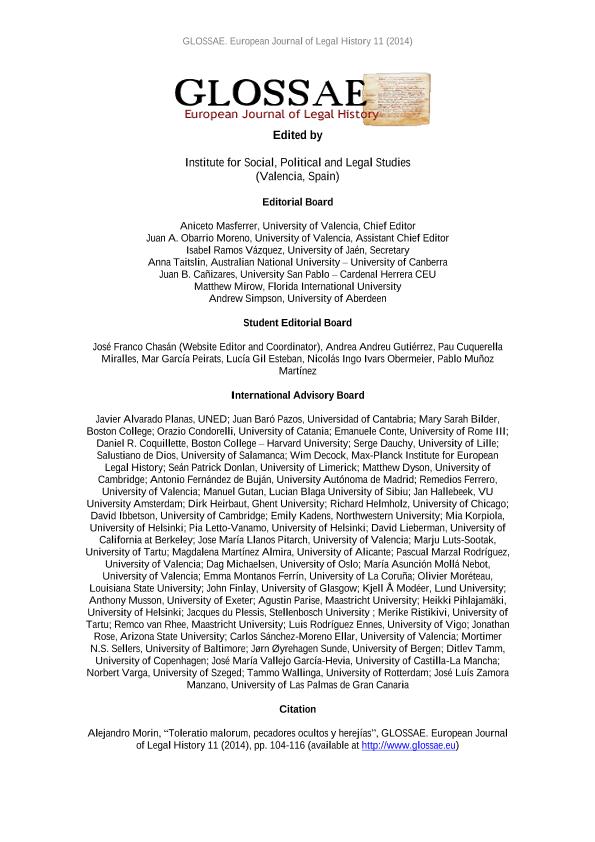Mostrar el registro sencillo del ítem
dc.contributor.author
Morin, Alejandro Juan

dc.date.available
2018-01-16T21:37:27Z
dc.date.issued
2014-11
dc.identifier.citation
Toleratio malorum, pecadores ocultos y herejías; Instituto de Estudios Sociales, Políticos y Jurídicos; Glossae; 11; 11-2014; 104-116
dc.identifier.issn
2255-2707
dc.identifier.uri
http://hdl.handle.net/11336/33561
dc.description.abstract
Frente a una tradición que ubicaba el nacimiento de la tolerancia en tiempos posmedievales, y frente al peso de la historiografía sobre la formación de la sociedad represora en el Bajo Medioevo, ha quedado planteada desde hace tiempo la existencia de un discurso medieval de la tolerancia. Definida en sus propios términos, la ?toleratio malorum? tendrá unos alcances ligados al nivel de apertura que se concedan las autoridades o a la evaluación de la utilidad que signifique en situación la limitación autoimpuesta. El rastreo de los escenarios textuales en los que se discute el poder correccional de la Iglesia y la necesidad (práctica o preceptiva) de la tolerancia puede incorporar también a la herejía en su horizonte si se hace operar la noción de crimen oculto, hecho que en general no es contemplado por los estudiosos de esta temática.
dc.description.abstract
In opposition to a tradition that located the birth of tolerance in postmedieval times, and in opposition to the weight of the historiography about persecuting society in Late Middle Ages, there has been established the existence of a medieval discourse of tolerance. Defined in its own terms, the toleratio malorum depends on the level of openness the authorities grant to themselves or on their evaluation of utility given by the autoimposed limitation. The survey of loci where there is discussed the Church’s correctional power and the need (practical or mandatory) of tolerance may also include heresy in its view if there is considered the notion of secret crime, an issue rather neglected by historians of this subject.
dc.format
application/pdf
dc.language.iso
spa
dc.publisher
Instituto de Estudios Sociales, Políticos y Jurídicos
dc.rights
info:eu-repo/semantics/openAccess
dc.rights.uri
https://creativecommons.org/licenses/by-nc-sa/2.5/ar/
dc.subject
Tolerancia
dc.subject
Pecado Oculto
dc.subject
Derecho Canonico
dc.subject.classification
Historia

dc.subject.classification
Historia y Arqueología

dc.subject.classification
HUMANIDADES

dc.title
Toleratio malorum, pecadores ocultos y herejías
dc.title
Toleratio malorum, hidden sinners and heresies
dc.type
info:eu-repo/semantics/article
dc.type
info:ar-repo/semantics/artículo
dc.type
info:eu-repo/semantics/publishedVersion
dc.date.updated
2018-01-16T18:40:41Z
dc.journal.volume
11
dc.journal.pagination
104-116
dc.journal.pais
España

dc.journal.ciudad
Valencia
dc.description.fil
Fil: Morin, Alejandro Juan. Consejo Nacional de Investigaciones Científicas y Técnicas. Oficina de Coordinación Administrativa Saavedra 15. Instituto Multidisciplinario de Historia y Ciencias Humanas; Argentina
dc.journal.title
Glossae
dc.relation.alternativeid
info:eu-repo/semantics/altIdentifier/url/http://www.glossae.eu/wp-content/uploads/2014/10/06-Morin.pdf
Archivos asociados
